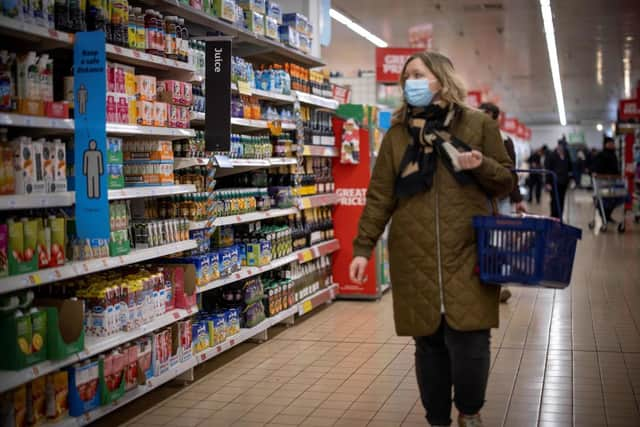UK inflation surges to near 30-year high of 5.5% as cost of living crisis continues
This article contains affiliate links. We may earn a small commission on items purchased through this article, but that does not affect our editorial judgement.
and live on Freeview channel 276
UK inflation has surged to a near 30-year high of 5.5% in January as the cost of living crisis continues.
Consumer Prices Index (CPI) inflation jumped from 5.4% in December - its highest level since March 1992, when it stood at 7.1%, the Office for National Statistics (ONS) said.
Advertisement
Hide AdAdvertisement
Hide Ad

The new rate of 5.5% is in line with most economists’ predictions but is still considerably higher than the Bank of England (BoE) target of 2% inflation.
Why is inflation so high?
The CPI measure of inflation is the rate at which the prices of goods and services bought rise .
The ONS said the cost of clothes and footwear pushed inflation higher last month, with the lowest January discounts in shops since 1990.
But inflation is soaring across the economy, driving CPI up to more than double the Bank of England’s 2% target.
Advertisement
Hide AdAdvertisement
Hide AdRising energy prices and fuel costs have been the biggest factors in driving inflation up to near 30-year highs, although food and drink prices, along with many everyday essentials have also been on the rise in recent months.
Loading....
Could inflation rise again?
The Bank hiked interest rates earlier this month to 0.5% in the first back-to-back increase since 2004, signalling more rises are on the way as it looks to rein in rampant inflation.
It is forecasting that inflation will soar even further this year due to surging energy price rises, before peaking at 7.25% in April – the highest level since August 1991.
The bank is expecting disposable incomes, post tax and inflation to fall by around 2% in 2022.
Advertisement
Hide AdAdvertisement
Hide AdGrant Fitzner, chief economist at the Office for National Statistics (ONS), said: “Inflation ticked up again in January, reaching a near 30-year high.
“Clothing and footwear pushed inflation up this month and although there were still the traditional price drops, it was the smallest January fall since 1990, with fewer sales than last year.
“The rising costs of some household goods and increases in rents also pushed up inflation.
“However, these were partially offset by lower prices at the pump, following record highs at the end of 2021.”
Advertisement
Hide AdAdvertisement
Hide AdBritons are facing further hikes this spring, with Ofgem increasing its annual energy price cap by nearly £700 in April on top of widespread inflation due to supply chain pressures and the government’s national insurance increase.
Figures released on Tuesday (15 February) revealed salary rises are already lagging behind inflation, with total pay growth up by 4.3% for the quarter to December, far below CPI.
Chancellor Rishi Sunak has so far resisted growing calls for his tax rise to be postponed and is instead offering support including a state-funded £200 discount on energy bills in October, which households will eventually need to repay.
Mr Sunak said: “We understand the pressures people are facing with the cost of living.
Advertisement
Hide AdAdvertisement
Hide Ad“These are global challenges but we have listened to people’s concerns and recently stepped in to provide millions of households with up to £350 to help with rising energy bills.”
What is inflation?
Inflation refers to the sustained rise in the prices of goods and services within a country over a set period of time.
Inflation rates vary all the time in response to external factors, such as the price of oil, which has risen recently as lockdown restrictions have been eased.
The ONS releases regular updates on the UK’s inflation rate for people to assess living costs and make changes.
Advertisement
Hide AdAdvertisement
Hide AdAs inflation rates increase so does the cost of living, meaning the value of currency decreases.
A message from the editor:
Thank you for reading. NationalWorld is a new national news brand, produced by a team of journalists, editors, video producers and designers who live and work across the UK. Find out more about who’s who in the team, and our editorial values. We want to start a community among our readers, so please follow us on Facebook, Twitter and Instagram, and keep the conversation going. You can also sign up to our newsletters and get a curated selection of our best reads to your inbox every day.
Comment Guidelines
National World encourages reader discussion on our stories. User feedback, insights and back-and-forth exchanges add a rich layer of context to reporting. Please review our Community Guidelines before commenting.
